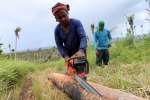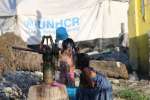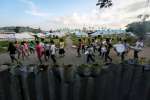Typhoon Haiyan: Chainsaw donation helps coconut farmers to branch out
News Stories, 31 March 2014
MERCEDES, the Philippines, March 31 (UNHCR) – From above, they look like giant matchsticks dropped from the sky. Closer up, it emerges that the rolling hills surrounding Mercedes town are dotted with thousands of downed coconut trees.
In Mercedes and other areas hit by Typhoon Haiyan in the central Philippines' Visayas region, more than 33 million coconut trees were lost across over 295,000 hectares of land, along with the livelihoods of an estimated 1 million coconut farmers.
Marcelino Manalo, 47, is one of them. But with the current distribution of chainsaws by the UN refugee agency and its partners, his fate could change. "If no one helped us here, our life would be extremely difficult," says Marcelino, who lives in Palamrag, a village in Mercedes where coconut farming is the main source of income.
To support recovery efforts in Eastern Samar and Leyte provinces, 500 chainsaws valued at about US$370,000 were recently donated to UNHCR by the Husqvarna Group, a Swedish company producing outdoor power products.
The donation will go a long way in assisting affected communities and the Philippines government to salvage and clear coconut trees felled by the typhoon. Salvaged trees can be made into coconut lumber to replace and rebuild houses damaged in the November 8 tragedy. They come as more than 1 million homes were lost in the typhoon's aftermath.
As Marcelino and other coconut farmers in the affected areas wait at least six more years for new coconut trees to bear fruit, the use of chainsaws will also help provide alternative sources of income.
"When the ground has been cleared of debris from the coconut trees, we can start planting sweet potato and other crops in between the trees again. We can eat these or sell them for a profit," says Marcelino.
The father of two participates in a cash-for-assets programme run by People in Need, a humanitarian relief organization that has partnered with UNHCR in deploying chainsaws in Eastern Samar. Trained under the programme as a chainsaw operator, he has earned up to 265 pesos (US$6) a day by clearing and processing destroyed coconut trees to be turned into lumber and charcoal.
He spends his income on his family's upkeep. Marcelino looks after his two young grandchildren, who have been left in his care after his daughters, aged 26 and 24, left with their husbands for the capital city of Manila, hundreds of miles away, to seek employment after the typhoon.
Enormous needs for livelihood and shelter have emerged months after the typhoon struck. To help the most vulnerable survivors rebuild their lives, UNHCR has distributed relief items to more than 680,000 people and continues to work with the Philippines government and its humanitarian partners in search of durable solutions.
UNHCR, which co-leads the typhoon inter-agency protection cluster with the government, has partnered with humanitarian organizations supporting early recovery, livelihood and shelter efforts to distribute the chainsaws in Eastern Samar and Leyte. These include the International Organization for Migration, Catholic Relief Services, Christian Aid, OXFAM, People in Need and ZOA.
Each of the chainsaws donated by the Husqvarna Group has been registered with state agency, the National Coconut Authority, in line with local regulations. When this round of typhoon recovery programmes has concluded, the chainsaws will be turned over to the authorities for their long-term use and as possible pre-positioned assets for the next emergency response.
By Johanna Morden in Mercedes, the Philippines

















































